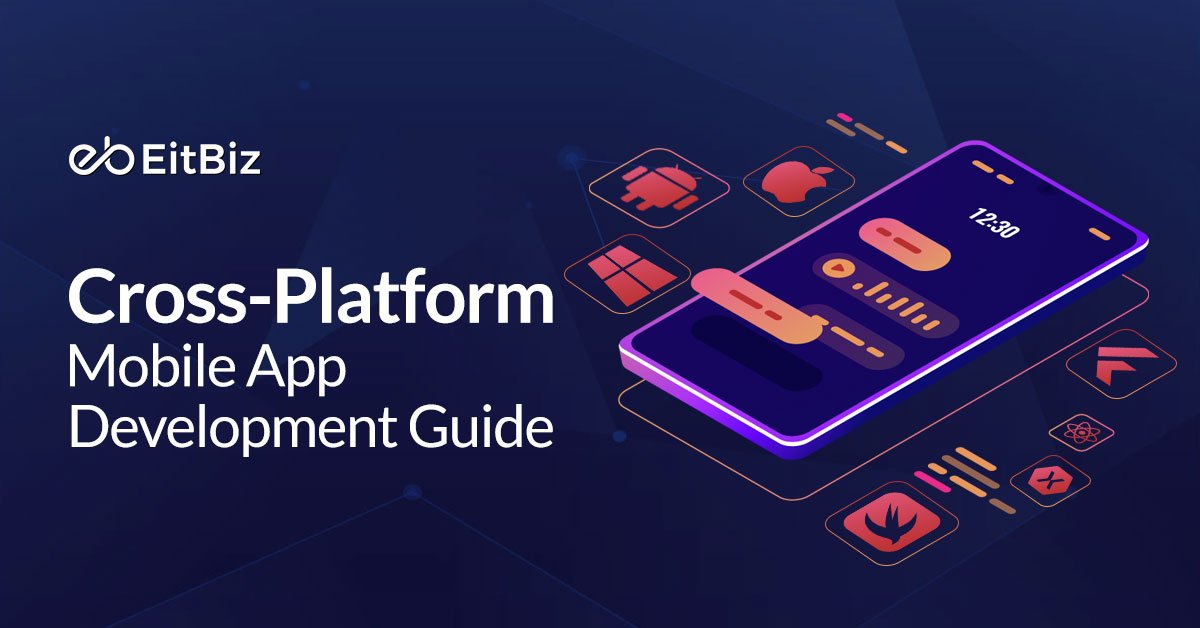You search for “Mobile App Development” on Google and somehow you might run into cross-platform app development!
But have ever wondered- Why?
Well, the answer to the question lies in its popularity and the abundant features it has to offer!
Did you know?
- Nearly 87% of developers are using cross-platform frameworks to build mobile apps.
- The market share of cross-platform app development is expected to grow at a CAGR of 15% from 2021 to 2026.
- Cross-platform app development framework can save around 30% to 40% time and money as compared to Native Apps.
Sounds surprising, doesn’t it?
Considering such facts, it’s no wonder why businesses are going crazy over “Cross-Platform Mobile App Development”!
Are you excited now to build a mobile app for your business? Before we dive into the steps, let’s understand what it exactly means!
What is Cross-Platform Development?
To put it simply, cross-platform app development refers to the mobile app development framework that builds mobile apps for multiple platforms using a single codebase. In short, developers can use the feature of “Code Reusability” to build robust, feature-rich, and scalable mobile apps that work seamlessly on a multitude of platforms, including Android and iOS.
Since developers need to write code once, they can effortlessly target multiple platforms and reach an extensive audience. From saving abundant time and money to easy maintenance, choosing cross-platform mobile app development is like a boon to businesses, especially startups with low budgets.
With so many features associated, it’s prudent to consider the wide range of benefits of cross-platform app development.
Without further ado, let’s dive in!
What are the Benefits of Cross-Platform Mobile App Development?
Here is a list of the potential benefits of cross-platform app development for your business.
One Code for all
One of the biggest benefits of cross-platform for mobile app development is that it efficiently uses a single codebase across all platforms. Thus, it simply means that developers can easily deploy and maintain without running into code complexity again and again.
Quick and Error-Free Development
Another major benefit of cross-platform app development is that developers can use a single codebase to build apps which ultimately help save significant time. Remember that faster development may lead to reduced costs and faster time to market which is important in today’s competitive landscape.
Uniform User Experience
Unlike native or hybrid app development frameworks, cross-platform renders a seamless and consistent user experience across multiple OS and devices. No matter whether your users are using Android or iOS, if they are using your app built via cross-platform, they can get the same experience which ultimately leads to enhanced engagement and retention.
Accessibility to Native Features
Another major highlight of cross-platform app development is that it allows developers to access native features and device functionalities such as GPS or cameras. Furthermore, it can significantly enhance the user experience and render specific features to each platform.
Hassle-Free Prototyping
Last but not least, cross-platform mobile app development is an ideal choice for developers planning to build prototypes and test app ideas across multiple platforms. Furthermore, it would help you identify the functional and ethical concepts before you invest in mobile app development.
Though the benefits sound tempting, now you might be wondering- How to build a cross-platform mobile app?
Let’s find out!
Step-By-Step Guide to Cross-Platform Mobile App Development
Building a cross-platform mobile app isn’t a cakewalk! From market research to deployment and post-maintenance support, there’s a lot involved in the cross-platform app development process. Let’s find out!
#1. Conduct Extensive Market Research
Before you embark on your journey to cross-platform app development, you should start diving deep into market research and know your audience better. Furthermore, doing so may help you understand what your audience wants and what they don’t want. When you build an app according to your user preferences, you may likely have an edge over your competitors. Try to keep an eye on your competitors to have an idea of what they doing and how you can incorporate their strategy with your techniques and methodologies.
#2. Choose the Right Framework
In the next step, you will need to choose the right framework for your mobile app development. Since there are many popular cross-platform app development frameworks available like Flutter, React Native, Ionic, and Xamarin, choosing the best one is important. Remember that each framework comes with its own set of strengths and weaknesses, which means you should first understand your audience, goals, and other aspects before making a decision.
#3. UI Design is Key
Once you are done choosing the framework, you should start focusing on building an appealing and user-friendly UI that aligns with your app’s objectives. Make sure your mobile app design is responsive because different users will use your app on different screen sizes. Thus, you should prioritize UI design when it comes to mobile app development.

#4. Dive into Coding
In this important aspect of cross-platform mobile app development, developers need to write the code to build a mobile app. With cross-platform, the best part is that developers need to write a single code only once and use it for building apps for different screen sizes and resolutions.
#5. Testing
After your final mobile app development, you need to test your app to identify and eliminate potential bugs or issues that might arise during testing. Furthermore, it will help provide a seamless user experience and they would likely recommend your app to their friends and peers.
#6. App Launch & Maintenance
It’s time to publish your mobile app on Google Play or Apple Store or both. Make sure you strictly adhere to the guidelines laid down by the App Store to avoid your app from getting banned. Even after publishing, your job is not over yet! Make sure you regularly update your app to make it relevant even after years.
Popular Frameworks for Cross-Platform Mobile App Development
Here is a list of the frameworks for cross-platform app development.
#1. Flutter
Flutter is one of the best (or the best) mobile app development frameworks that enable developers to build solid, responsive, and user-friendly apps with just a single code. With its hot reload feature, developers can view changes instantly without reloading the app.
#2. React Native
Developed by Facebook, React Native is another popular cross-platform app development framework that enables developers to build mobile apps with ease. With its component-based architecture, it enables developers to build intricate UIs utilizing reusable components.
#3. Xamarin
Another popular cross-platform app development framework, Xamarin allows developers to build native Android, iOS, and Windows apps using C# and.NET. Furthermore, developers can share a multitude of codes on different platforms. Also, it enables developers to access native APIs with the framework which ensures enhanced performance and seamless user experience.
#4. Swift UI
Built and launched by Apple, it is one of the popular cross-platform app development frameworks that helps build dedicated iOS apps for Apple OS, including native iOS, macOS, watchOS, and tvOS apps. If you are a business planning to build iOS apps, they can use this framework.
Final Thoughts
So, there you have it! That’s a wrap to the complete cross-platform mobile app development in 2024!
Building a solid cross-platform app could be potentially exciting and daunting. With cross-platform, you can build a solid, efficient, functional, and feature-rich app that perfectly caters to a broad range of audiences. Remember that the success of your app depends on your business objectives and the framework that you choose. Have a mobile app idea in mind? Partner with EitBiz and build a responsive and performance-centric mobile app for your business. Drop us an email at info@eitbiz.com or call us at +1(812)530-6300 today!







